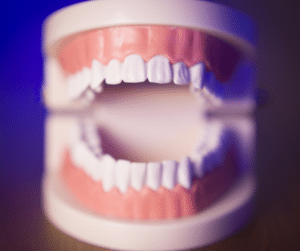Is It Time For Dentures?

Most people do not ever think that they will need false teeth. Dentures may bring back memories of elderly people in by-gone eras, perhaps teeth on a bedside table with bubbles floating around them. No one wants to admit to needing teeth other than the ones they were born with and it can be very difficult to come around to making a major decision like this. Besides the general stigma of dentures only being for “old” people, they can be quite expensive and sometimes uncomfortable to wear. So how do you make the decision to move forward?
First, consider your current pain levels. Are you constantly having tooth aches or abscesses? Are your teeth so worn down that you're almost chewing with your gums already? Do you frequently have sores in your mouth because your teeth are hitting gums or not coming together properly? Do you suffer from cuts on the inside of your cheek because your teeth are out of alignment and causing problems? If the problems are severe enough, you might want to consider dentures. The pain after a surgery to remove your teeth and place dentures will at least be toward a goal of better bite and of less pain, whereas your current pain will only get worse with time. Think about how you want to spend you waning years, with pain or without?
Next, consider eating. If you are having trouble with chewing right now, can you expect that that will improve? Perhaps you only need a partial in order to re-gain your bite and make it easier to chew the foods that you want. If you already have a partial or two, however, you may not have enough solid teeth to hook a third one onto. You'll then have to make a decision about whether you want to significantly reduce the variety of foods you eat, switch to pureeing everything, or go to dentures. It can be a scary decision, but if you focus on the outcomes of each choice, it can help to alleviate the stress of it.
Another consideration is, of course, cost. The cost of dentures can be very overwhelming, especially to someone on a fixed income. However, if another partial will cost $1200-$1500 and dentures would cost $6000, it may be a smart move. Talk with your dentist about time frames that you might be able to keep your current teeth. Look at the real-time numbers and make your decision with both eyes open. You could potentially live with your real teeth for longer and incur less expense, but it might also be at the expense of more time spent in office for fittings for partials and trying to keep up the other teeth that are quickly deteriorating. Maybe dentures would not be right for you, but if they are, do not shy away because the cost is more. It might end up being less in the long run.
Finally, consider your smile. Some people stop smiling altogether because the look of their teeth bothers them, especially if they've lost a significant number of them or if they're yellowed with age and worn. If this is you, know that you should never stop smiling, even if you're without teeth. If it bothers you greatly, you should go ahead and get teeth. Life is far too short to stop smiling and laughing because you're worried about how it will look. Teeth hold the shape of your face and give you structure.
So eat, smile, laugh and be without pain. If it takes dentures to do those things, so be it!
